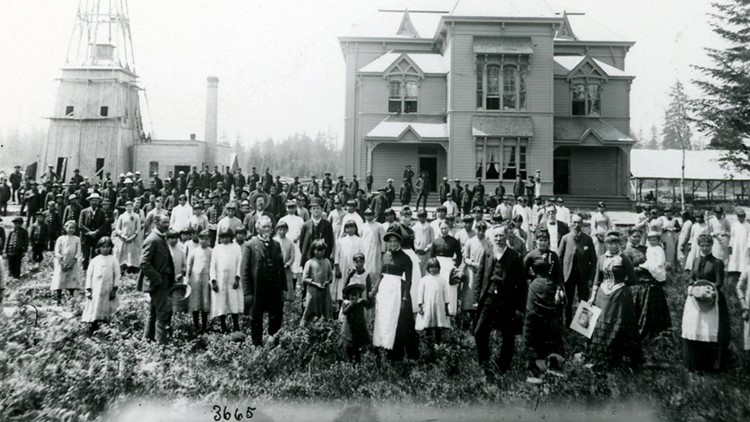SALEM, Ore. — Chemawa Indian School in Salem — the oldest continuously operated residential boarding school for Native American students in the United States — may come under federal review following U.S. Department of the Interior Secretary Deb Haaland's call for the government to investigate its past oversight of such schools.
Located just east of Keizer Station, Chemawa had about 335 students enrolled as of October 2019. The off-reservation institution is more than 125 years old and one of only four Native American residential boarding schools still in existence in the United States and run by federal agencies.
That said, there are 183 federally-funded elementary and secondary schools total. Of those, 53 are operated by the Bureau of Indian Education, including Chemawa, and 130 are tribally controlled under BIE contracts or grants.
Haaland's new Federal Indian Boarding School Initiative follows the recent discovery of 215 unmarked graves by Canada's Tk'emlúps te Secwepemc First Nation at the Kamloops Indian Residential School.
The U.S. initiative instructs investigators to prepare a report detailing available historical records, with an emphasis on cemeteries or potential burial sites, relating to the federal boarding school program in preparation for future site work.
Haaland — a member of the New Mexico's Laguna Pueblo and the first Native American to serve as a Cabinet secretary — outlined the national initiative last month when addressing members of the National Congress of American Indians during its midyear conference.
RELATED: More than 200 bodies found at Indigenous school, where First Nations children were forced into Canadian assimilation
"The Interior Department will address the inter-generational impact of Indian boarding schools to shed light on the unspoken traumas of the past, no matter how hard it will be," Haaland said in her announcement.
"I know that this process will be long and difficult. I know that this process will be painful. It won't undo the heartbreak and loss we feel," she said. " But only by acknowledging the past can we work toward a future that we're all proud to embrace."
Haaland wrote in a memorandum that the findings in Canada are prompting the United States to reflect on its past now. But this history and trauma have been here for decades.
Beginning with the Indian Civilization Act of 1819 and running through the 1960s, the United States enacted laws and implemented policies establishing and supporting Indian boarding schools across the nation.
During that time, the purpose of Indian boarding schools was to culturally assimilate Indigenous children by forcibly relocating them from their families and communities to distant residential facilities where their American Indian, Alaska Native, and Native Hawaiian identities, languages, and beliefs were to be forcibly suppressed.
In most instances, Indigenous parents could not visit their children at these schools. Many students endured routine injury and abuse. Some perished and were interred in unmarked graves. Survivors of the traumas of boarding school policies carried their memories into adulthood as they became the aunts and uncles, parents, and grandparents to subsequent generations.
The loss of those who did not return left an enduring need in their families for answers that, in many cases, were never provided. Distance, time, and the scattering of school records have made it more difficult, if not impossible, for their families to locate a loved one's final resting place and bring closure through the appropriate ceremonies.
There have been calls to investigate gravesites at Chemewa specifically for years.
Marsha Small is a doctoral candidate at Montana State University, and until recently was the Teppola distinguished visiting professor at Willamette University's anthropology department, according to a recent article by Oregon Public Broadcasting.
She conducted research on Chemawa's cemetery in 2016 for her master's thesis. In her research, Small discovered 222 sets of remains at Chemawa, OPB reported. That's more than the 208 she said the federal government had documented at the school cemetery.
But other than one row of graves, the markers and locations of remains don't match up, according to the report. Also, Small noted her radar technology could only penetrate one meter into the ground, leaving her to suspect there are more remains buried deeper.
She's hoping to find out more when she returns to the Salem campus in September.
Chemawa's school site has been used almost continuously since the 19th Century, with the date 1880 displayed prominently on campus.
The National Native American Boarding School Healing Coalition has created a list of at least 367 school sites across the country, the vast majority of which haven't operated as schools for years.
It lists nine schools in Oregon — the current Chemawa site in Salem and its predecessor in Forest Grove, as well as seven other locations scattered throughout the state that are not currently open, according to the healing coalition.
In more recent memory, Chemawa was featured by NFL Films for rebounding from a winless, pointless season.
The school was also at the heart of an original investigation by OPB that highlighted allegations of fraud, mismanagement and student deaths.
A 2017 investigative series by OPB reported the deaths of three Chemawa students, one who died on campus and two who died shortly after leaving the school. A fourth student died in Wyoming less than two weeks after leaving Chemawa and after the series was published.
The reports came to light during a congressional hearing in 2019 when Oregon U.S. Reps. Kurt Schrader and Suzanne Bonamici criticized the school for failing students and the tribes who entrusted their children to the school's care.
A federal gag order stopping school administrators and community members from speaking to journalists and elected officials was lifted that year, leading to a story published by the Statesman Journal in 2020.
When the announcement for the federal review initiative first came out last month, Amanda Ward, Chemawa's academic principal and acting superintendent, said she hadn't heard anything yet on how it could impact Chemawa.
The Statesman Journal has reached out to Chemawa leadership since but has not heard new updates on the school's role in the future investigation.



